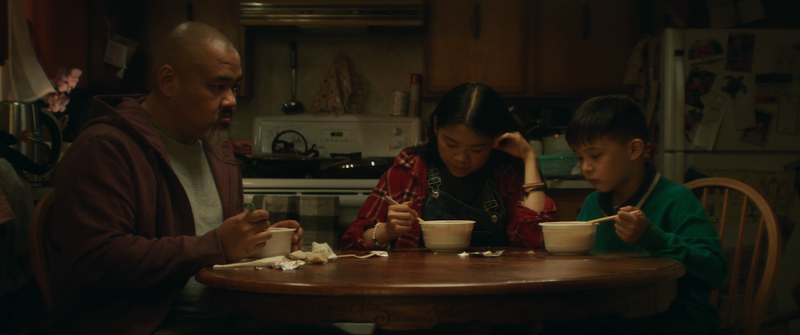
A Funeral, a Dream, and the Cost of Both
Sorry for Your Cost
MOVIE REVIEW
Sorry for Your Cost
-
Genre: Drama
Year Released: 2024, 2025
Runtime: 15m
Director(s): Rosie Choo Pidcock
Writer(s): Rosie Choo Pidcock
Cast: Adeline Lo, Olivia Cheng, Simon Chin, Lucas Mocchi, Enid-Raye Adams
Where to Watch: shown at the 48th Asian American International Film Festival
RAVING REVIEW: Some stories speak softly but leave you stunned. SORRY FOR YOUR COST is a perfect example of how to nail that idea. Writer-director Rosie Choo Pidcock crafts a deeply affecting short that doesn’t try to shout over its audience—it simply invites you to sit with uncomfortable truths. Running a brisk 15 minutes, this is a film that understands the power of restraint. Through intimate moments, cultural nuance, and quiet, yet devastating decisions, it captures a particular kind of heartbreak rarely addressed on screen: the toll of grief when it meets financial hardship.
The story centers on a young Chinese Canadian woman caught in a moment that changes everything. Her family is working class, her dreams are big, and the support system around her is loving—but fragile. When circumstances shift, she finds herself torn between honoring what was and fighting for what could be. That’s about as much as one should know going in. The beauty of this short lies in its delicate exploration, revealing its truths not through grand revelations but through choices—some painful, some necessary, all achingly human.
Pidcock’s direction is personal and purposeful. Her voice as a filmmaker feels both urgent and lived-in, shaped by her own experiences with grief and cultural expectation. But the film never veers into sentimentality or self-indulgence. Instead, it sits with the complications of mourning in a world where even saying goodbye comes with a price tag. This isn’t grief wrapped in poetic monologues—it’s grief wrapped in paperwork, bank balances, and battles society has forced us to face.
Leading the film is Adeline Lo, in a breakout performance that’s subtle and restrained. She captures the weight of decision-making with a realism that speaks louder than dialogue ever could. Olivia Cheng plays a smaller but pivotal role, lending grace and grounding to the film’s foundation. The supporting cast—Simon Chin, Lucas Mocchi, and Enid-Raye Adams—round out the ensemble with authenticity, each performance serving the story rather than distracting from it.
There’s a quiet intentionality to how SORRY FOR YOUR COST presents itself—nothing feels polished for drama, nor does it lean into emotional manipulation. Instead, the film’s color palette, grounded lighting, and close-but-unobtrusive framing reflect the tension between emotional vulnerability and everyday survival. Pidcock resists the temptation to romanticize grief, and that restraint becomes one of the film’s most powerful tools. In a cinematic landscape full of hyper-stylized shorts, the rawness of SORRY FOR YOUR COST stands out not through spectacle, but through contrast. Its strength lies in how little it tries to impress—and how deeply it connects because of that.
But what makes SORRY FOR YOUR COST linger with you is its larger context. It speaks to a collective experience that’s often invisible in mainstream storytelling—how systems built around death can magnify pain rather than ease it. For working-class families, particularly within immigrant communities, grief doesn’t exist in a vacuum. It shares space with economic strain, generational pressure, and cultural duty. This short doesn’t preach or offer solutions. Instead, it captures the reality of that emotional calculus with quiet clarity.
The title alone suggests the dilemma at hand. What is the cost of saying goodbye—and who ends up paying it? By never answering directly, the film encourages reflection rather than judgment. It’s not about right or wrong. It’s about understanding how the burden of love can become overwhelming when filtered through the complexities of money, loss, and obligation.
It’s no surprise that SORRY FOR YOUR COST has made a name for itself on the festival circuit. With support from institutions like the National Film Board of Canada and the Canada Council for the Arts, it’s a project that blends deeply personal roots with wide-reaching social commentary. Still, it never loses its intimate tone. You get the sense this story could only have come from someone who lived it—or something close to it.
Pidcock’s voice as a filmmaker feels vital. She explores family, culture, and personal identity through a lens that is rarely offered the spotlight. In a world filled with loud, overlong content, SORRY FOR YOUR COST stands out by doing the opposite. It’s quiet. It’s short. And it devastates.
Please visit https://linktr.ee/overlyhonestr for more reviews.
You can follow me on Letterboxd, Instagram, Twitter, and YouTube. My social media accounts can also be found on most platforms by searching for 'Overly Honest Reviews'.
I’m always happy to hear from my readers; please don't hesitate to say hello or send me any questions about movies.
[photo courtesy of BOLDLY CREATIVE AGENCY, MIMOSA PRODUCTIONS]
DISCLAIMER:
At Overly Honest Movie Reviews, we value honesty and transparency. Occasionally, we receive complimentary items for review, including DVDs, Blu-rays, CDs, Vinyl Records, Books, and more. We assure you that these arrangements do not influence our reviews, as we are committed to providing unbiased and sincere evaluations. We aim to help you make informed entertainment choices regardless of our relationship with distributors or producers.
Amazon Affiliate Links:
Additionally, this site contains Amazon affiliate links. If you purchase through these links, we may receive a commission. This affiliate arrangement does not affect our commitment to honest reviews and helps support our site. We appreciate your trust and support in navigating these links.